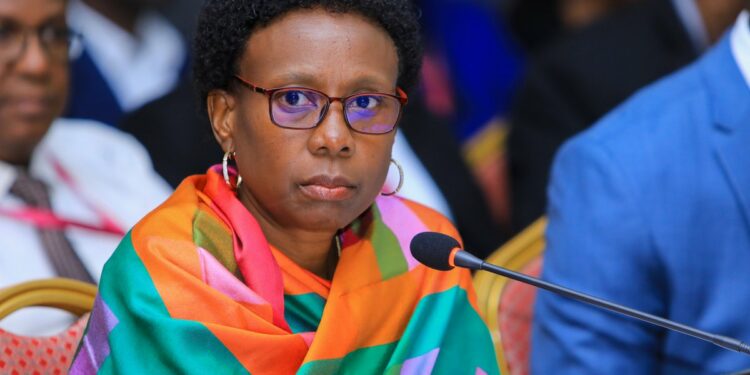The Minister of Health, Dr. Ruth Aceng, has defended the government’s proposal to borrow $18.09 million (approximately UGX 65.9 billion) from the African Development Fund to finance the expansion and equipping of the Uganda Cancer Institute (UCI). Speaking before Parliament’s National Economy Committee on Tuesday, Dr. Aceng emphasized that the funds would address the rising demand for cancer care and alleviate the overwhelming workload on the country’s oncologists.
“The doctors are very few and overwhelmed with work. If you stepped inside Uganda Cancer Institute today, from the doorway, corridors, even near the washrooms, there are patients,” Dr. Aceng said. She highlighted the stark contrast between Uganda and other countries, where one doctor typically attends to one or two patients daily. “These ones see how many in a day? In huge numbers, anyone would get tired and not do exactly what you would want to do. That is why we need to train as many oncologists as possible, but also, we need to recruit them and remunerate them better.”
The project is part of the East Africa Centres of Excellence for Skills initiative, in which Uganda was designated to lead in oncology, while Tanzania and Kenya focus on cardiology and pathology, respectively. However, Dr. Aceng noted that Uganda’s progress was hampered by the COVID-19 pandemic, necessitating additional funding to complete the delayed work.
Henry Musasizi, Minister of State for Finance, detailed the setbacks in the construction of the cancer center, initially planned for completion in 24 months but delayed by 18 months due to pandemic disruptions and contractor cash flow challenges. He explained that the prolonged timeline led to increased costs for materials and labor.
“The demand for cancer care is growing, and this, coupled with inadequate infrastructure, has incapacitated the Uganda Cancer Institute from providing effective service delivery to patients,” Musasizi said. “Currently, the cumulative number of patients on the waiting list for nuclear medicines stands at over 500 adult patients. Expansion of treatment and care facilities is thus a priority for the government.”
Musasizi warned that the limited infrastructure not only leads to congestion but also results in more complications, higher treatment costs, premature deaths, and increased referrals abroad.
Robert Migadde, Vice Chairperson of the National Economy Committee, questioned the impact of the proposed expansion on regional health services. “Are we going to see an end to people going to other nations if we approve this loan? Because we have patients going to Aga Khan Hospital. Now that we have East Africa with Kenya and Rwanda, are we going to see different patients coming here for the different services?” he asked.
Dr. Aceng assured the committee that the expanded facility would not only reduce medical tourism outflows but also position Uganda as a regional hub for oncology care, bringing in patients from neighboring countries.
According to Dr Aceng, the proposal, if approved, promises to provide relief to the strained UCI staff and improve access to cancer care for thousands of patients, marking a significant step in the fight against cancer in Uganda and the East African region.
Do you have a story in your community or an opinion to share with us: Email us at editorial@watchdoguganda.com










